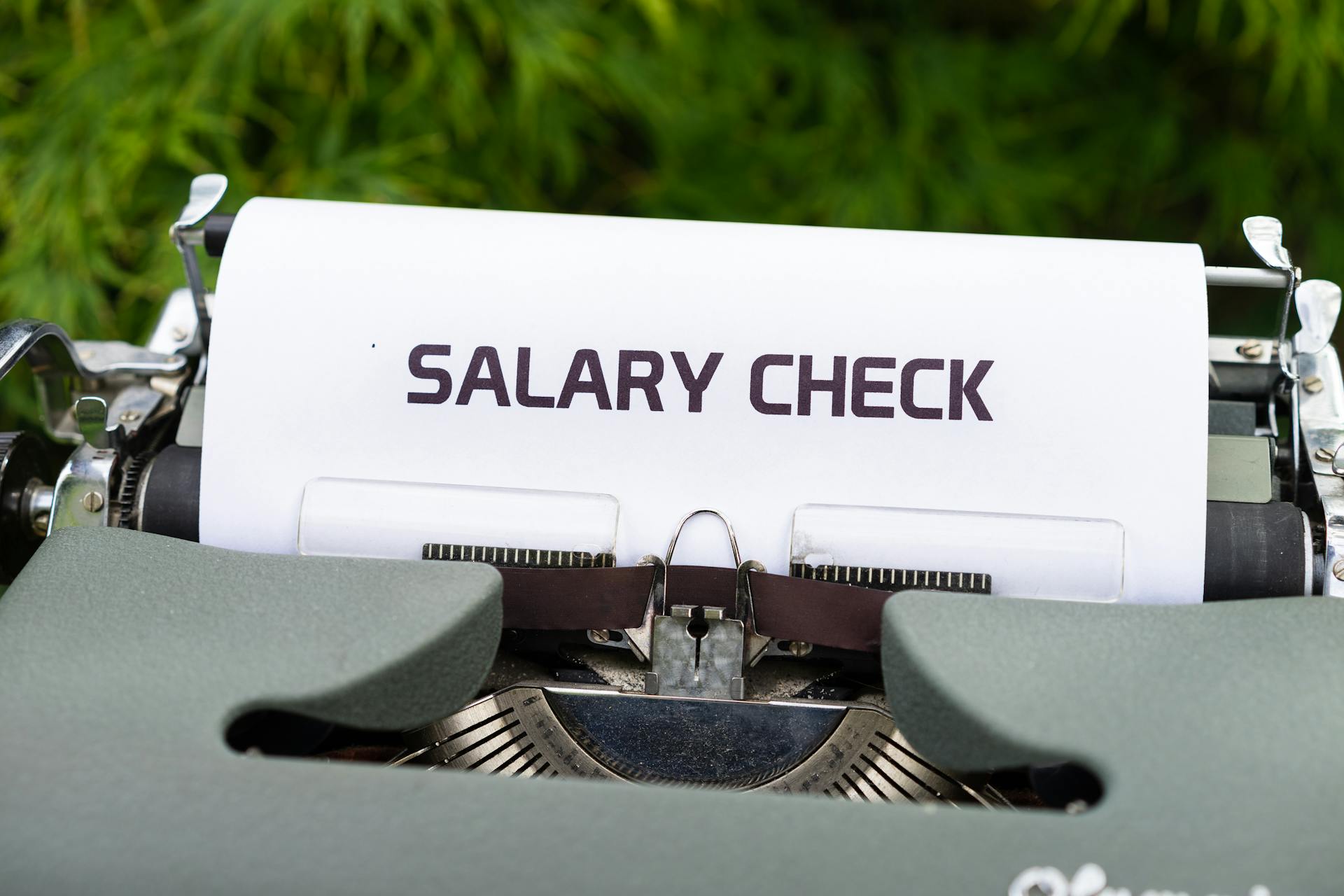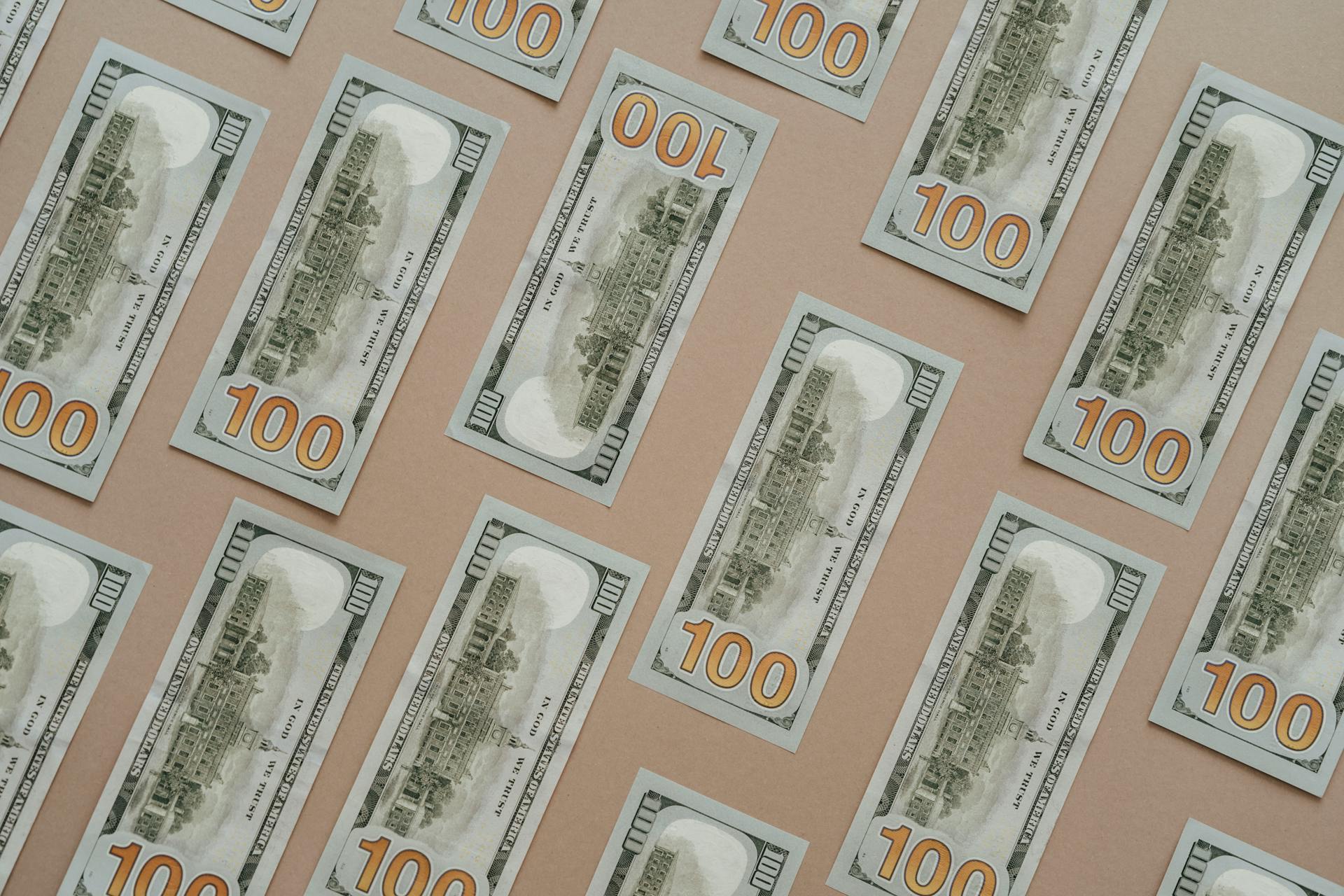
Interest can start accruing on a credit card balance as soon as you make a purchase, even if the due date is weeks or months away.
Typically, credit card companies charge interest daily, based on the average daily balance.
If you pay your balance in full each month, you won't have to worry about interest charges.
However, if you only make the minimum payment, interest can add up quickly.
See what others are reading: Does Interest Accrue Daily
Understanding Credit Card Interest
Credit card interest can be confusing, but let's break it down simply. Most credit cards have variable APRs that can fluctuate with the prime rate, and as of September 2024, the average APR was 24.74%.
You're only charged interest if you don't pay your bill in full each month, and that interest is calculated daily by multiplying your balance by a daily interest rate. For example, if your card has an APR of 16%, the daily rate would be 0.044%, and if you had a balance of $500, you'd incur $0.22 in interest that day.
A different take: Does Mortgage Interest Accrue Daily
The good news is that most credit cards offer a grace period, which is a small window of time when the credit card issuer doesn't charge interest. This period usually starts on the card's statement date and ends on the payment due date. However, if you don't pay off your balance in full, you can lose your grace period until you make 1 to 2 consecutive payments for the full statement balance.
How Credit Card Interest is Calculated
If you carry a balance on your credit card, the card company multiplies it each day by a daily interest rate and adds that to what you owe.
The daily rate is calculated by dividing your annual interest rate (APR) by 365. For example, an APR of 16% would result in a daily rate of 0.044%.
Carrying a balance of $500 for a month with no additional charges would result in a total balance of $506.60, including interest.
In This Article
In this article, we'll explore the ins and outs of credit card interest, including what you need to know about grace periods.
A grace period is a stretch of time during which you are not charged interest or fees on money you've borrowed. The length of grace periods can differ by lender and loan type.
Some credit cards offer a grace period, but not all do. You should read the terms and conditions in your credit card agreement to confirm.
To find out how a grace period works for your specific card, look for sections like "When We Charge Interest", "Grace Periods", or "Paying Interest" in your credit card agreement.
If you don't pay off your statement balance in full, you can lose your grace period until you make 1 to 2 consecutive payments for the full statement balance.
Here's a quick rundown of what you can expect from different types of loans:
Qualifying Transactions
Your credit card's grace period can save you from interest payments on regular purchases if you pay your statement balance on or before the due date each month.
To qualify for a grace period, check your cardholder contract, as it may specify that it applies to both regular purchases and balance transfers, or only to one of them.
Cash advances typically don't qualify for a grace period and start accruing interest from the day they're made.
If you're carrying an outstanding balance from a previous billing cycle, your grace period may not apply to new purchases until you've paid your statement balance in full.
A 0% introductory APR on balance transfers can be a good way to avoid interest charges, but only if you pay off the transferred balance in full before the end of the intro period.
Be aware that making a late payment during the introductory period can switch you to the standard purchase interest rate or even a higher penalty rate.
Managing Credit Card Periods
Credit card periods can be confusing, but understanding how they work can save you money and stress. The grace period, for example, is the time between the end of your billing cycle and your payment due date, and it's usually between 21 and 25 days.
Most credit cards offer a grace period, but the specific terms and conditions vary by card. You can find the details in your credit card agreement, usually in sections like "When We Charge Interest", "Grace Periods", or "Paying Interest."
To avoid losing your grace period, make sure to pay off your statement balance in full by the due date. If you don't, you might lose your grace period until you make 1 to 2 consecutive payments for the full statement balance.
Expand your knowledge: Define Enhanced Due Diligence
What Is a Period?
A credit card grace period is the time between the end of your card's billing cycle and the date your payment is due. This period can last anywhere from 21 to 25 days, depending on the card issuer.
Additional reading: Does Interest Accrue during Grace Period
Most card issuers offer this interest-free period on purchases, but the specific terms and conditions vary by card. The CARD Act requires companies to make their grace periods at least 21 days, but it doesn't require credit cards to have them at all.
The payment due date usually coincides with the end of your grace period, and it's the same day each month. This means you won't accrue interest on new purchases made during the previous billing cycle if you pay your card off in full each month on or before your due date.
If your payment due date falls on a day when payment isn't accepted, like a weekend or holiday, then payments made on the next business day are not considered late. This effectively extends your grace period.
A different take: Accrue Payment
Managing Your Period
You can lose your grace period if you don't pay off your statement balance in full, which means you'll have to wait until you make 1 to 2 consecutive payments for the full statement balance before it renews.
To avoid losing your grace period, make sure to pay your statement balance in full by the due date. This will keep your interest-free period intact.
The statement closing date is when the credit card company tallies up all your account activity from the past month, and any transactions that occur after this date will appear on the next month's statement.
Here's a breakdown of the key dates to keep track of:
By paying your entire statement balance by the due date, you'll get to enjoy a new interest-free period for the next billing cycle.
Bank-Specific Information
Some banks, like Wells Fargo, will charge a late fee if the payment is not made by the due date, but interest will still accrue on the outstanding balance.
TD Bank, on the other hand, will not charge a late fee, but interest will still be added to the statement after the due date.
In general, it's best to check your bank's specific policy on interest accrual and late fees to avoid any unexpected charges.
Broaden your view: During Forbearance Interest Will Still Accrue on Your Loans
Citibank
Citibank has a minimum grace period of 23 days for regular purchases. This means you won't have to pay interest on your purchases for at least 23 days.
To be eligible for this grace period, you must have paid your balance in full for the previous 2 billing cycles. This is a great incentive to stay on top of your payments and avoid interest charges.
You won't be able to take advantage of the 23-day grace period for revolving balances, cash advances, or balance transfers, unless you're participating in a 0% promotion. These types of transactions typically come with different rules and fees.
If you lose your 23-day grace period, you can reinstate it by paying off your balance for 2 consecutive pay periods. This will help you get back on track and avoid interest charges.
Wells Fargo
Wells Fargo has a 25-day minimum length of grace period for regular purchases, but only if you've paid your balance in full for the previous billing cycle.
You must have paid your balance in full for 1 previous billing cycle to be eligible for the 25-day grace period on regular purchases. This means you'll need to make a payment plan to pay off your balance before the next billing cycle.
Revolving balances, cash advances, and balance transfers (excluding 0% promotions) are not eligible for the 25-day grace period. This means you'll need to prioritize paying off these types of balances as soon as possible.
To reinstate a lost grace period, you'll need to pay off your balance for 2 consecutive pay periods. This will give you another chance to take advantage of the 25-day grace period on your regular purchases.
You might enjoy: What Does Accrue Deductions Means Finiance
Interest Accrual and Billing Cycles
Interest accrues daily on your credit card balance, with the daily rate calculated by dividing the annual interest rate by 365. This means that if you carry a balance on your credit card, you'll be charged interest on your outstanding balance every day.
The daily interest rate is usually a small percentage, such as 0.044% for an APR of 16%. To give you an idea of how quickly interest can add up, if you had a balance of $500 on the first day, you would incur $0.22 in interest that day, for a total of $500.22 on the second day.
Credit card companies typically charge interest on your unpaid balance, which is why it's essential to pay your bill in full each month to avoid interest charges. If you don't pay your balance in full, you'll be charged interest on your interest, which can lead to a rapidly growing balance.
The credit card company's billing cycle plays a crucial role in determining when interest accrues. The billing cycle is typically a month, with two important dates involved: the statement closing date and the payment due date. The statement closing date is when the credit card company tallies up all your account activity from the past month and generates your credit card statement.
The payment due date must fall on the same day of each month, and it must be at least 21 days after the statement closing date. This means that your due date won't change, but the closing date might adjust from one month to the next to allow for the required 21 days.
Consider reading: When Does Post Judgment Interest Begin to Accrue
Here's a summary of the key dates involved in a credit card billing cycle:
The grace period is an essential concept to understand when it comes to credit card interest. If you pay your entire statement balance by the due date, you'll enter the grace period for the next billing cycle, during which you won't be charged interest on new purchases until the due date of the next cycle.
Sources
- https://www.synchrony.com/blog/bank/credit-card-terms-you-need-to-know
- https://www.investopedia.com/articles/01/061301.asp
- https://upgradedpoints.com/credit-cards/credit-card-grace-periods/
- https://www.nerdwallet.com/article/credit-cards/credit-card-grace-period
- https://www.experian.com/blogs/ask-experian/what-is-a-grace-period/
Featured Images: pexels.com


